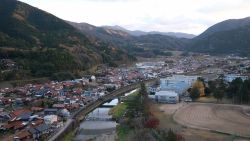
Originally published on metropolis.co.jp on November 2011
OK, IF YOU SAY SO
- A Japanese aid worker who was rescued from the rubble following last month’s earthquake in Turkey said that the glow from her laptop “calmed me down and gave me hope to stay alive.”
- The newly installed head of the US Navy’s 7th Fleet, which is based in Yokosuka, claims to spend “a lot of time thinking about North Korea.”
- Officials at Mitsubishi Heavy Industries say that no national defense secrets were lost during a recent cyber-attack on its servers, although the company didn’t rule out the possibility that “important data, such as those related to nuclear power, have been leaked.”
- An Air SDF pilot whose plane crashed into the East China Sea in July and whose body was never recovered is believed to have suffered from G-LOC, or g force-related loss of consciousness.
- A poll conducted by the Yomiuri Shimbun and the Xinhua news agency found that 17 percent of Japanese have a positive view of relations with China, while 46 percent of Chinese have a positive view of Japan.
FAMOUS FIRSTS
- Researchers at Nagoya University have grown a “fully functional pituitary gland” from embryonic stem cells taken from mice.
- Scientists in Hiroshima say they have “succeeded in developing a method of removing radioactive cesium from sludge using bacteria.”
- Researchers at the government-backed Riken Institute unveiled a supercomputer whose processing ability tops 10 petaflops, or 10 quadrillion calculations per second.
- Toyota says that its new Aqua subcompact hybrid car can travel about 35 kilometers per liter of gasoline, making it “the most fuel-efficient car in the world.”
DOUBLE BUMMER
- Police in Hyogo discovered the body of a 66-year-old woman inside a steel drum filled with concrete at a rental storage space, and then they found a man’s corpse inside a plastic bin in a different rental storage room.
- A veterans’ group dedicated to memorializing the experience of some 600,000 Japanese Imperial Army troops held captive in Siberia at the end of World War II has disbanded because “several central figures have died and the average age of former POWs nears 90.”
- The finance ministry announced that Japan’s national debt has reached ¥954,418 trillion—a record. That’s ¥7.45 million for every man, woman and child in the country.
- The US-based Institute of International Education said that the number of Japanese students enrolled in American universities has declined by 14.3 percent compared to last year.
- Sentence of the Week: “Journalist Soichiro Tahara said Thursday he will not appeal a court ruling earlier this month ordering him to pay about ¥1 million in compensation to the parents of a victim of North Korea’s abductions over remarks he made on a TV talk show that abductees must already be dead and that the Foreign Ministry is aware of it.” (via Kyodo)
CRIME LOG
- The justice ministry announced that 2,271,309 crimes were committed in Japan last year, a drop of 5.4 percent from 2009.
- In 52.1 percent of the cases, police were able to make an arrest or at least identify a suspect. That figure was also an improvement.
- At the same time, the number of crimes committed by people aged 65 or above has surged 6.8-fold since 1991.
- The ministry also found that the recidivism rate of underage offenders was 38.5 percent, and that “about 30 percent of juveniles sent to reformatories joined underworld organizations after being released.”
- Officials say that of the 630,000 “pirated items” confiscated by Japanese customs in 2010, more than 90 percent came from China.
NEWS FROM THE FRONTIER
- Russian officials on one of the disputed northern islands asked the Japanese government for help in treating a boy who suffered severe burns in an explosion. The 12-year-old was transported to a hospital in Sapporo.
- The very next day, President Dmitry Medvedev announced that Russia will maintain its military presence on the islands as a way of protecting its borders.
- The Japanese Embassy in Seoul lodged a complaint against a visit by five South Korean lawmakers to the disputed Takeshima Islands for a concert.
- Apparently, the concert “was intended to underline South Korea’s control over the islets and raise the spirits of its coast guard units stationed on them.”
- Stay with us on this one: The South Korean Supreme Court upheld a lower court’s acquittal of a Korean resident of Japan who was jailed in South Korea for spying for North Korea while studying in Seoul in 1994.

ONWARD AND UPWARD
- It’s official—Guinness World Records has declared the 634m-tall Tokyo Sky Tree the world’s tallest tower, supplanting the 600m Guangzhou Tower in China.
- It is hoped that a new “open skies” agreement between Japan and Taiwan will boost the number of Taiwanese tourists coming here.
- An American scientist whose work “led to the creation of stronger, lighter alloys used in cellphones” was one of three winners of this year’s Kyoto Prize, which is worth a cool ¥50 million.
- It was reported that a Fukushima-based manufacturing company has received 3,000 pre-orders for its newly developed Geiger counters, including one that “allows users to display radiation readings on a smart phone.”
- Bottom Story of the Week: “Man Reunited with Fateful Picture Book After Some 70 Years.” (via The Mainichi Daily News)
Compiled from reports by AP, Japan Today, The Japan Times, The International Herald Tribune, The Asahi Shimbun, The Mainichi Daily News, Daily Yomiuri, AFP, Reuters and Kyodo







